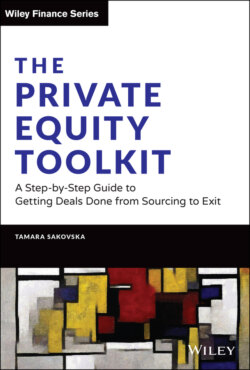Читать книгу The Private Equity Toolkit - Tamara Sakovska - Страница 25
Deal Sourcing Strategies
ОглавлениеWhat sourcing strategies are out there? Generally, people in our industry talk about two types of private equity deals: thematic and opportunistic. Thematic investments are potential transactions that you identify proactively through the rigorous and granular research of a particular industry subsector, emerging trend or a specific investment thesis. Thematic deal ideas sometimes do not have any obvious catalysts and can take a long time to become actionable. Opportunistic investments rely on a more passive effort on your part: they are inbound transactions that simply land on your desk. Opportunistic transactions are typically a lot more actionable: there is often a motivated seller who wants to get a deal done within a specific timeframe. The majority of opportunistic deals are introduced by sell-side intermediaries, professional connections and, less frequently, friends or acquaintances.
Based on what I have seen in the private equity market, most firms tend to pursue both types of deal sourcing approaches in order to develop a sustainable flow of new investment ideas. Thematic deal sourcing helps you narrow down your area of focus and build a knowledge base, which in turn increases the probability of finding an opportunistic deal in which your firm can position itself ahead of the competition as the most credible buyer.
The longer I worked on both thematic and opportunistic transactions, the more I thought about how to optimize the deal search process for both types of deals in order to create an effective routine. It took me many years, with many ups and downs, to outline a set of steps for myself that were easy to follow and gave me confidence that I was being thorough in my work and spending my time efficiently. The effort of documenting my deal sourcing approach ultimately morphed into a couple of fairly detailed frameworks which I will describe later in the book. What was I trying to achieve? I thought that the holy grail of my deal sourcing activity was to find a proprietary deal, either opportunistic or thematic.
Finding a proprietary transaction is a true obsession of the private equity industry. What makes a deal truly proprietary? When the transaction is not widely known in the market and your firm is the only party having discussions with the target company, then you are working on a proprietary deal. Sometimes the deal can be semi-proprietary: a few other market players might be aware of it and circle the same target. However, it is possible that your firm may be ahead in its learning curve and, therefore, manage to agree a period of exclusivity, during which you can evaluate and execute this investment. There may be cases when your firm succeeds in engaging in a truly proprietary dialogue with a great business found through months-long thematic research, only to be told by company owners that they will invite additional bidders. Why? Mostly because multiple bids typically make price discovery more accurate and give the owners an opportunity to maximize valuation. In this case, your proprietary idea will enter the open market and, I can tell you from my own experience, it is a rather painful feeling.
Why is it so hard to find proprietary deals? The private equity industry has matured over the years and there are literally hundreds of new funds entering the industry across the globe each year. As information barriers diminish, company owners are getting more sophisticated too, and are far more likely to hire a professional adviser than deal with just one private equity fund in a proprietary transaction. So, why do private equity investors continue to obsess over finding a proprietary deal? Well, everyone likes a competitive sport. Also, finding a proprietary deal is a great opportunity to showcase your professional finesse and highlight your fund's distinct advantage to your LPs. Your fund investors will feel like they have gained access to an exclusive deal club and, provided your fund's returns do not disappoint, will be keen to invest in your next fund when the time comes.
Theoretically speaking, finding a deal outside of a competitive auction should result in a lower entry valuation too. As the only bidder, your fund may avoid having to overpay in order to secure the deal. However, I am not so sure that the notion of a more reasonable entry valuation holds every time. I can think of a number of scenarios in which your fund may decide to pay a fairly high valuation in a proprietary situation. For example, your sector expertise may enable you to take an informed view of unique value creation levers that exist only in this company and not in other comparable businesses. You might decide to pay a premium because your fund may value transaction certainty and seek to benefit from lower execution costs. These are just some of the reasons that might explain a higher entry valuation in a proprietary transaction. Teten and Farmer (2010) remark in their study that sometimes private equity firms agree to pay a higher multiple of earnings for a proprietary deal because it enables them to pursue higher quality targets to begin with and also add more value after the deal closes.
In summary, proprietary deals have become exceedingly difficult to find—but they are not just a myth of the private equity industry. It makes more sense to think of them as an infrequent but completely plausible phenomenon, like a solar eclipse. As rare as they are, we can still expect to experience them once, and hopefully even multiple times during our careers.
